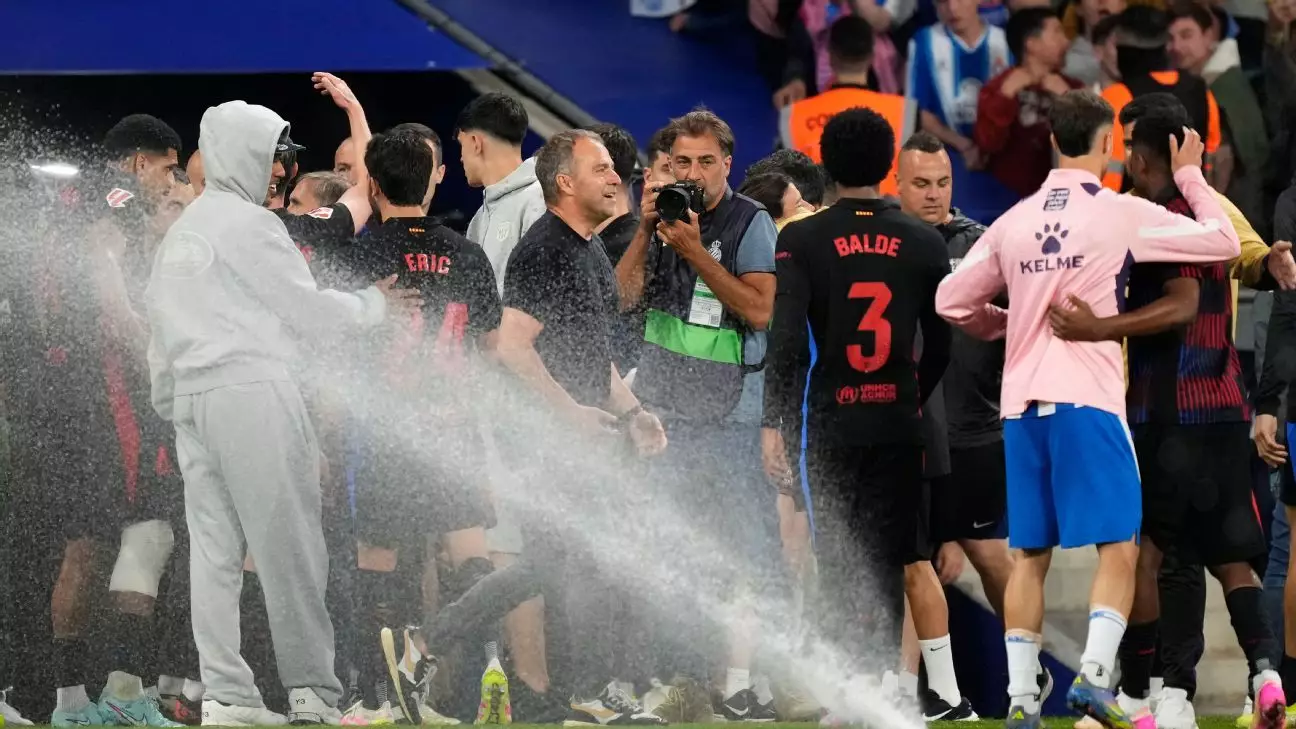In the world of football, actions often speak louder than words. Recently, the Barcelona coach Hansi Flick demonstrated this adage perfectly during his team’s triumphant match against Espanyol, where they secured their LaLiga title with a resounding 2-0 victory. His effective management of the situation, particularly in ensuring a respectful celebration, turned a potentially explosive occasion into a largely harmonious event. This became a vivid example of how leadership and emotional intelligence can alter the course of events, not just for the players, but also for the spectators and even the rival team.
Hansi Flick minimized the risk of chaos—a challenge that loomed over this match, especially given the previous confrontational atmosphere two years prior. On that occasion, tensions flared following Barcelona’s title win when Espanyol fans breached the pitch, causing a dangerous situation. This time, Flick’s leadership shone through as he promptly led his players off the field amid heightened emotions, demonstrating that sometimes celebrating in the confines of the dressing room—not on hostile ground—is the wiser option.
Respect Over Rivalry
Tension can often overshadow sporting achievements, but Flick offered a refreshing approach that favored respect and dignity over provocation. Following the game, Espanyol’s coach, Manolo González, commended Flick, stating, “It doesn’t make any sense to generate anything bigger.” The acknowledgment of mutual respect suggests that sporting rivalries, while fierce, should not come at the expense of safety or decency.
The reaction from Flick mirrored this sentiment. He emphasized that celebrating inside was not only safer for the players but also embraced respect for the fans—both home and away. He reflected on the past chaos, asserting, “We celebrate in the dressing room, it was great, fantastic. The players can do that.” His message was clear: celebrating triumph is essential, but doing so in a way that values sportsmanship is paramount.
Building a Culture of Integrity
Flick’s decisions are indicative of a broader trend in football that prioritizes the well-being of all parties involved over the mere results on the pitch. By fostering a culture of integrity and respect, he sets a positive example for younger players who are just beginning their careers. Celebrations should not escalate conflicts but rather serve as an opportunity for unity and joy—an idea that Flick has embodied through his actions.
His successful management of this tense situation is not only a testament to his skills as a coach but also as a leader. Flick’s understanding of when to celebrate and when to step back calls for a broader conversation within football regarding the role of coaches in pivotal moments. Are they purely tactical strategists, or do they also bear the responsibility of shaping the ethos of the sport? Flick clearly sees the value in the latter.
Achieving Triumph Beyond the Scoreboard
The fact that this victory catapulted Barcelona seven points ahead of their closest rival, Real Madrid, further highlights the weight of this moment. Winning the league for a record 28th time is a feat that deserves celebration; however, doing it with poise enhances the glory of the achievement. Flick’s first year at Barcelona has been marked not just by accolades—like clinching the Spanish Supercopa and Copa del Rey alongside the LaLiga title—but also by the manner in which these victories were attained.
As the fans eagerly awaited an open-top bus parade to honor the team, Flick urged supporters to enjoy the festivities. “Go and celebrate,” he encouraged, signaling a complete embrace of joy and community. His recognition that the happiness of the fans is a significant part of the sport underscores his core values, which prioritize team spirit and collective celebration.
In essence, the significance of this defining match goes beyond the scoreline. Hansi Flick’s measured approach, emphasizing dignity and respect while still allowing for celebration, marks a pivotal moment in his career and leaves a lasting impression on the game. Here, we see a coach not just leading his team to victory but also guiding them through the complexities of passion, rivalry, and sport. This awareness of the larger narrative in sportsmanship is exactly what makes Flick not only a good coach but a transformative one.


Leave a Reply